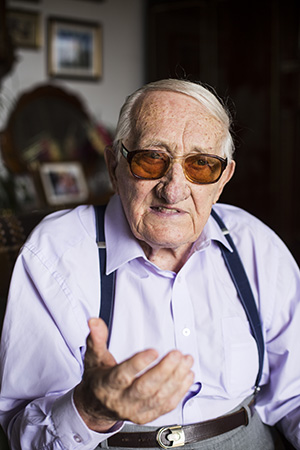
Photo by Andrzej Banaś
We were
immediately
told that
it was
a labour camp,
not a health resort,
and we would
never leave it
alive.
Play Broadcast 1
Play Broadcast 2
I feel defiled. I am being accused of genocide, but it’s me who’s the victim. Karol Tendera, a KZ Auschwitz survivor, feels very strongly about the foreign media and their reports on “Polish concentration camps”. The 95-year-old from Kraków puts a lot of energy and determination into dispelling historical negationism. He even took legal action against ZDF, the German TV station.
When Karol Tendera heard that ZDF was reporting on “Polish death camps in Majdanek and Auschwitz”, he knew he had to do something about this. He sued the TV station, demanded an apology and a donation of 50 thousand euros for social causes. I want the forgers of history to apologise to our state authorities and the entire nation. I want them to be punished for the smear campaign, he says.
When the German occupation of Poland began in 1939, Karol Tendera was only 18 years old (he was born in 1921 in Kraków). He attended the Mechanical Vocational School in Krupnicza Street, and he was taken straight from the school grounds in 1940 and transported to Germany to become a slave labourer. He worked for two years as a car mechanic in a slave labour camp in Hanover. In May 1942, he managed to escape and returned to German-occupied Poland. He had only a few months to enjoy his freedom, before being arrested in January 1943. He was first transferred to the Gestapo headquarters in Pomorska Street, and later on to the prison in Montelupich Street.
In February 1943, Karol Tendera was transported to KZ Auschwitz. Hunderttausendvierhundertdreißig [100430 – editor’s note] was my name at the camp, he recalls as he quickly recites in German his camp number that is still tattooed on his forearm. He was horrified by the place he had ended up. It was sheer hell. We were immediately told that it was a labour camp, not a health resort, and we would never leave it alive. The only way out was through the chimney stacks of the crematoria, says Karol Tendera.
He still remembers every single day in KZ Auschwitz and Birkenau: the gruelling hours of digging the trenches, the pain from the blows, the hunger, and the thirst. I was sure I was going to die, he admits. He managed to survive, but freedom was still far away. In autumn 1944, Karol Tendera was transported to KZ Flossenbürg, a satellite German camp in Litoměřice, in the Czech Republic, where he was detained until the end of the war.
While in Auschwitz, I joined an underground organisation set up by Witold Pilecki. I can proudly say that I was defending my country. I risked my life for the nation. That is why Karol Tendera feels so strongly about phrases such as “Polish concentration camps”, which puts the responsibility for German-inflicted atrocities onto their Polish victims. I have to constantly disclaim and explain what really happened. For instance, I was once asked by an elderly German lady about the people we, the Poles, detained and murdered in the camps.



